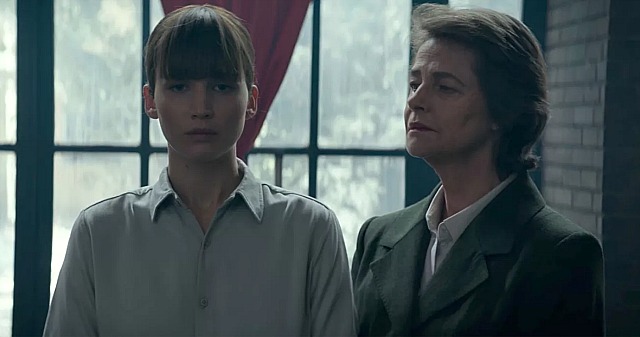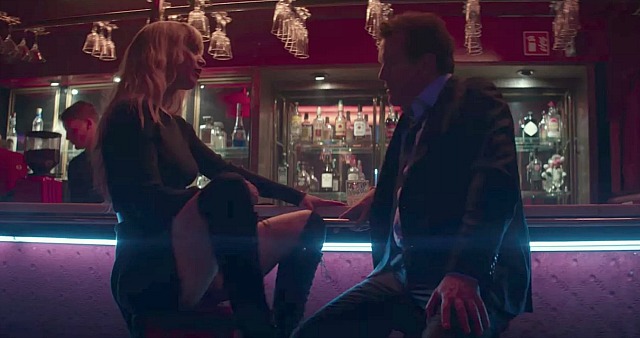The first term that comes to mind when thinking of Francis Lawrence‘s Red Sparrow (20th Century Fox, 3.2), which I saw last night, is “ice-cold,” and I don’t just mean the simulations of snow-covered Russia. (The film was shot in Hungary, Slovakia, Austria and, very briefly, London.) Almost everything that happens in this 139-minute, Americans-vs.-Russians spy thriller is coated with malice and arctic frost — just about every line, expression, motivation or attempt at manipulation, and every act of sadistic brutality, sexual or otherwise.
No one expects a film about a beautiful, poker-faced Bolshoi ballerina (Jennifer Lawrence‘s Dominika Egorova) being forced, after a horrid physical injury, to enroll in “whore school” (Lawrence’s term) to become a government-controlled seductress or “red sparrow,” and then graduate into the realm of double agentry, to provide any kind of emotional balm. But for the most part Red Sparrow goes out of its way to avoid even a faint hint of humanity.
Except, that is, for a couple of brief scenes between Dominika and Joel Edgerton‘s Nathaniel Nash, a CIA agent with a semblance of a heart. (The story begins with Nash on the outs with his bosses for behaving stupidly during a nighttime incident in a Moscow park, and then he attempts to redeem himself by recruiting Dominika into working for the Americans.) There are two or three scenes of domestic bonding between Dominika and her irritatingly dependent mother (Joely Richardson), but honestly? I was kind of hoping mom would get rubbed out as all she does is sit around and serve as a kind of albatross.
This is not, to put it mildly, a double-agent film with the finesse and subtlety of, say, Martin Ritt‘s The Spy Who Came In From The Cold (’65), which was regarded as a rather cold-hearted piece when it opened a half-century ago. The focus on cruelty in Red Sparrow makes that John Le Carre adaptation seem rather mild in this regard. At every turn Sparrow says “try a little heartlessness.”
Red Sparrow is more in the realm of Atomic Blonde, the period (late ’80s) spy film with Charlize Theron, minus the gymnastics. It’s an aggressively sexual thing, I mean, but is mainly about all kinds of physical brutality, including a pair of attempted rapes and two especially savage beating-and-torture scenes that would, in the real world, result in God-knows-how-many-weeks in a hospital.
Most of the violence, sexual and otherwise, happens to poor Dominika, and after the third or fourth assault I was asking myself, “Is this a movie for the #MeToo era?” I suppose it is, in a way, as it does allow for a form of satisfying fuck-him revenge at the finale. But in my seventh row seat in a 20th Century Fox screening room, I was as much of a recipient of the brutality as Lawrence, and after a while I felt covered with bruises. Sorry but I empathize. It’s in my nature.

I forget how many nude scenes Lawrence is required to perform, but after a while I was saying to myself “Jesus, another one?” I actually became bored at the prospect of watching Lawrence disrobe or take a shower or taunt a would-be rapist into doing the deed. The scenes at the Sparrow Academy, in which Charlotte Rampling plays a kind of icy-dominatrix instructor, are meant to be a hoot, I guess, but to me they felt flat, as did the film itself for the most part.
Justin Haythe‘s script is based upon Jason Matthews’ same-titled 2013 novel. I haven’t read it, but reviews mentioned Matthews’ “sly descriptions” and “rich patter,” and how the book “provides insight into the mundane aspects of the intelligence field” and indulges in “point-of-view whiplash shifts.”
It sounds as if Haythe used the bare bones of Matthews’ plot and then went to town.
I looked at my watch three or four times. The first was about 40 minutes in. I felt devastated when I looked a second time and realized there was a full hour to go.
Red Sparrow has been directed with a more-or-less straight face. It’s a piece of cold narrative efficiency minus any kind of flamboyant relish (except in terms of the brutality). It’s been professionally assembled and generally feels like an A-level effort. I was especially taken by Jo Willems‘ ace-level cinematography, which reminded me now and then of Freddie Young‘s lensing of Doctor Zhivago. But oh, that feeling of ice in the blood.
All the men in the film except for Edgerton’s character are pigs and pricks, for the most part. Their combined mission statement: “We will use you, exploit you, beat you, fuck you up and then spit you out.” Nice to know ya, fellas!
The performances struck me as acceptable. The film’s mechanized plotting and general absence of soul don’t allow for much else. All the “Russian” performers (Lawrence, Schoenhearts, Rampling, Richardson, Jeremy Irons and Ciaran Hinds) make an attempt to tone down the accents. The only “American” who really stands out is one played by Mary-Louise Parker. Her character, identified on the Wiki page as “Senator Stephanie Boucher,” didn’t look or behave like an elected official to me, but at least she’s convincing as a jaded alcoholic.
I was relieved that Lawrence decided against making a great effort to sound like a Russian woman struggling with English. She sounds, really, like an American actress trying to avoid any semblance of this. She doesn’t sound like Tatyana, I can tell you.
Tatyana didn’t feel as beaten-up by Red Sparrow as I did. She was kind of mild-mannered about it on the way home in the car. She loved James Newton Howard‘s score (along with what she believed were portions of classical music) and was stirred by the visual simulations of Russia by way of Hungary and Slovakia — the architecture, the “Moscow” subway, the evocations of Moscow street life, etc. Actual Tatyana quote: “I loved [Lawrence’s] naked scenes. I find her very hot.”













